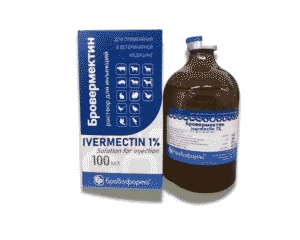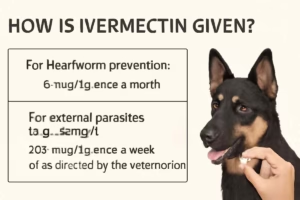Introduction to Ivermectin for Cats
Ivermectin is a vital medication commonly prescribed for treating parasitic infections in cats. It’s known for being effective against a range of parasites like ear mites, heartworms, and mange. However, its safety and effectiveness depend heavily on administering the correct dosage, as cats have a unique sensitivity to medications.
When Ivermectin is prescribed, it is essential to follow the exact dosage your veterinarian suggests. Higher doses may be required for conditions like heartworms, but Ivermectin can be dangerous if not given properly. For cats, even small deviations from the prescribed amount can lead to harmful side effects.
For more on other parasitic treatments for pets, check out Proin ER 74 mg for Dogs: 5 Shocking Truths.
The key takeaway is that Ivermectin is a powerful, effective solution for treating parasitic infections, but only if properly administered. Always consult with your vet to ensure you’re using the correct dosage for your cat’s unique needs.

What is ivermectin?
Ivermectin is often used as a heartworm preventive for dogs, but it can also be used for cats to treat internal parasites like hookworms and roundworms and external parasites such as ear mites and scabies. While it’s not the first choice for treating cats, it’s still effective for a variety of parasitic issues when prescribed by a veterinarian.
For information on other treatments for parasites, see Simplicef 100mg for Dogs Guide.
One thing to keep in mind is that Ivermectin for cats is often used off-label, meaning it’s not specifically approved for all the conditions being treated, so it’s crucial to follow the directions exactly as given. Since cats can be more sensitive to Ivermectin than dogs, the dosage must be monitored closely to avoid toxicity.
Ivermectin for Cats Overview
| Medication Type | Anti-parasitic |
| Form |
Tablets and topical liquid (ear drops); injectable forms licensed for use in farm animals. |
| Prescription Required? | Yes |
| FDA Approved? | Ivermectin is FDA-approved for use in several animal species but is not specifically FDA-approved for cats. Its use in cats is considered off-label. |
| Life Stage | Generally used for adult cats but may be prescribed for kittens with caution, depending on the condition and under a veterinarian’s supervision. |
| Brand Names | Heartgard and Acarexx otic suspension licensed for use in cats. Various products licensed for use in farm animals. |
| Common Names | Ivermectin |
| Available Dosages | Heartgard tablets 55 micrograms (up to 5 pounds) and 165 micrograms (5 to 15 pounds). Acarexx otic suspension 0.01% solution. Injectable 10 milligrams/milliliter various products licensed for use in farm animals. |
| Expiration Range | Typically, Ivermectin has a shelf life of 1-2 years. Always check the specific expiration date on the packaging and store as recommended (e.g., away from light and heat). |
What Does Ivermectin Treat in Dogs and Cats?
Ivermectin is commonly used for heartworm prevention in both dogs and cats, but it also treats a range of other parasites. It’s effective against mange, including demodectic mange and sarcoptic mange, as well as ear mites, hookworms, roundworms, and even tapeworms and liver flukes. This makes Ivermectin an essential tool for managing several parasitic conditions that can affect pets.
In cats, Ivermectin is often used in deworming and treatment protocols for more challenging parasitic infections. However, due to their sensitivity, it’s important to stick to the prescribed dosage to avoid complications. Ivermectin can be a highly effective medication, but it must be given properly and according to the required guidelines set by a veterinarian.
For other treatment options, read Marbofloxacin for Dogs: The Essential Antibiotic.
How is ivermectin given?
When it comes to giving Ivermectin to cats, there are several methods depending on the form of medication prescribed. It can come in the form of tablets, chewable tablets, topical liquid, or even as an injectable solution. For ear mite treatments, Ivermectin is often applied directly into the pet’s ears, while oral forms are used for treating other parasitic issues. Regardless of the form, it’s crucial that you administer the medication exactly as directed by your veterinarian.
For advice on giving pets medication, see Clavamox Dosage for Dogs: How Much is Too Much.

If you’re using Ivermectin in pill form, it can usually be given with food to make the process easier, especially for cats who may be more sensitive to the taste. However, vomiting can occur if the cat is sick or the stomach is empty. In such cases, contact your veterinarian for further guidance. If your cat receives an injectable form, the veterinarian typically administers this in their office and monitors the cat for effects. The medication generally takes one to two hours to take effect, but always follow the instructions carefully to ensure the effectiveness of the treatment. Additionally, laboratory tests may be required to evaluate the cat’s response, especially if you’re treating an ongoing or serious infection.
What if I miss giving my pet the medication
- If you miss a dose, give it as soon as you remember, provided it’s not too close to the next dose.
- Do not give extra doses to make up for a missed dose.
- If too much time has passed, contact your veterinarian for advice.
- For heartworm preventive, maintaining a consistent dosing schedule is critical.
- If two doses are missed or more than eight weeks have passed, consult your vet for further guidance.
- Are there any risk factors for this medication?
For guidance on missed doses and medication schedules, check out Apoquel Dosing Chart.
Ivermectin is generally safe for treating parasites in cats, but there are specific risk factors to be aware of. For example, Ivermectin should NOT BE USED in dogs or cats younger than six weeks unless specifically directed by a veterinarian. Additionally, cats with a negative heartworm test should not be given Ivermectin unless the proper conditions are met.
Certain breeds, such as collies, sheepdogs, and their crosses, may have a genetic mutation (MDR1) that makes them sensitive to Ivermectin and less able to tolerate higher doses. This mutation can cause severe side effects, even with prescribed doses of the medication. For MDR1-affected pets, genetic testing is recommended before treatment to ensure they can tolerate Ivermectin. Always consult with a veterinarian to evaluate the safety and suitability of Ivermectin for your cat’s specific breed and medical needs.
Benefits of Ivermectin Cream
Ivermectin cream offers a unique alternative to the oral or injectable forms of Ivermectin, especially for cats with specific skin conditions. When prescribed by a veterinarian, this cream provides a targeted treatment for localized issues, directly addressing problems on the skin’s surface. The cream allows for minimal systemic absorption, reducing the risk of side effects that can occur with broader systemic treatments. It’s an effective way to treat certain conditions without affecting the whole body, providing a safer option for cats who may be sensitive to other forms of Ivermectin.
Comparison with Other Parasitic Treatments
Ivermectin stands out as an effective solution for treating various parasites in cats, but it’s important to consider it alongside other treatments and medications. While Ivermectin works well for many types of parasitic infections, there are instances where it may not be the best treatment option, especially if other treatments have failed or if there is a risk of resistance. Each treatment has its specific indications and limitations, making it crucial to consult a veterinarian. They can help determine the best care approach, taking into account the unique needs of your cat and the parasites involved.
Where to Buy Ivermectin for Humans and Pets
- Ivermectin should be purchased in the correct formulation for cats.
- Pet owners should consult veterinary sources for pet-specific formulations.
- For humans, Ivermectin can be found in pharmacies, but it may require a prescription.
- Always ensure the medication’s safety and efficacy by consulting a veterinarian before use.
- Never use human Ivermectin for animals unless specifically prescribed for animal use.
Use of Ivermectin Paste and Other Forms
Ivermectin paste is often used for larger animals like horses, but it is not recommended for cats due to the precise dosing required. The paste formulation may not provide the level of accuracy needed for smaller animals like cats, which could lead to safety concerns. Instead, veterinarians typically prescribe liquid or injectable forms of Ivermectin for cats, as these offer better control over the dosage and ensure effective parasitic treatment. While Ivermectin in different forms offers versatility, it’s critical to follow your vet’s guidance to ensure the safety and effectiveness of the medication.
Managing Risks and Side Effects
- Ivermectin may cause side effects such as vomiting, lethargy, and neurological effects in cats.
- If administered improperly, it can lead to serious complications.
- Always follow the veterinarian’s instructions for accurate dosage and treatment.
- Monitor your cat closely for any changes in behavior or health during the treatment period.
- Contact your vet immediately if you notice any severe side effects.
- Avoid giving higher doses than recommended to prevent toxic reactions.
- Veterinarian supervision is essential when using Ivermectin for cats with specific health concerns or conditions.
- Regular check-ups during the treatment period can help ensure safe use of the medication.
For more on precautions and risks, see The Ultimate Minocycline for Dogs Dosage Guide.
Ivermectin Safety in Multi-Pet Households
In households with multiple pets, ensuring the safe administration of Ivermectin is vital to avoid accidental exposure. When treating cats, it’s crucial to prevent cross-species usage, as Ivermectin for dogs and cats may differ significantly in dosage, which can be harmful if not properly administered. Safe storage of the medication is equally important to avoid accidental ingestion by other pets. Dogs may tolerate higher doses of Ivermectin, but it can be dangerous for cats, so always follow the veterinarian’s directions carefully. In multi-pet households, using separate, clearly labeled products for each species can help ensure safe and effective treatment. Always consult your veterinarian if you have concerns about the proper administration of Ivermectin.
Maximizing Effectiveness While Ensuring Safety
To ensure Ivermectin works as an effective parasitic treatment for cats, it’s crucial to administer it correctly by following the administration guidelines provided by the veterinarian. Giving the correct dosage is an essential step in maximizing its effectiveness while maintaining safety. Cat owners must pay careful attention to the prescribed protocols, as even small deviations can affect the outcome.
Always consult your veterinarian before beginning medication to ensure the right treatment plan for your pet’s health needs. By adhering to the prescribed protocols, your cat can lead a healthier, parasite-free life. This proactive approach will give your pets the best chance of remaining free from harmful parasites while keeping them safe from potential risks.
Ivermectin for Cats Dosage Chart
The proper dosage of Ivermectin for cats is critical to avoid toxicity, and should always be based on the veterinarian’s instructions due to their sensitivity to medications.
| Condition | Dosage | Frequency |
| Heartworm Prevention | 0.012 mg/lb (0.024 mg/kg) | Once monthly |
| Ear Mites/Parasite Treatment | Varies by condition & form | As prescribed |
Ivermectin Dosage Guidelines for Dogs
Here are standard dosage ranges for dogs based on the condition being treated:
| Condition | Dosage | Frequency |
| Heartworm Prevention | 0.0015–0.003 mg/lb (0.003–0.006 mg/kg) | Once monthly |
| Mange/Skin Parasites | 0.15 mg/lb (0.3 mg/kg) | Once, repeat in 14 days |
| GI Parasites | 0.1 mg/lb (0.2 mg/kg) | Single dose |
Drug Interactions
When using Ivermectin for cats, it’s important to exercise caution if your pet is on other drugs, particularly Comfortis or any flea prevention medication. These drugs can sometimes interact with Ivermectin, increasing the risk of adverse reactions. While Ivermectin is effective for treating parasitic infections, combining it with other treatments or using higher doses than prescribed can lead to unwanted side effects. Always consult with a veterinarian before administering multiple medications to ensure the safety of your pet.
Ivermectin Product Forms
Ivermectin is available in various forms designed for different species and intended use. For cats, it is most commonly found in injectable solutions or oral liquids, tailored to ensure precise dosage and effectiveness. While paste and tablets are often used for larger animals like horses, these forms are typically off-label for cats and should be avoided unless specifically directed by a veterinarian. Additionally, products like Heartgard Plus and Iverhart, which combine Ivermectin with pyrantel pamoate, are primarily used for deworming and heartworm prevention in dogs, not suitable for cats. Always follow your vet’s recommendations to ensure your cat receives the appropriate form of Ivermectin for its specific needs.
Tips for Pet Owners
When using Ivermectin to treat cats, it’s important to administer the medication exactly as directed by your veterinarian. Cats are sensitive to Ivermectin, and improper dosing can lead to serious side effects. Always refer to the dosage chart provided by your vet to ensure accuracy. If you are using Ivermectin-based preventatives, make sure to have your cat tested for heartworm annually, as this helps ensure proper dosing and effectiveness.
Store all Ivermectin products safely, out of reach of both pets and children. Keep any Ivermectin treatments specifically designed for cats separate from those intended for dogs, as the dosages differ. By following these simple steps, you can ensure that Ivermectin is used safely and effectively for your cat’s health.
Overdose and Emergencies
Ivermectin has a safety margin that, when exceeded due to overdoses, can cause serious symptoms in cats. While overdoses are rare, accidental ingestion of Ivermectin, especially heartworm prevention tablets or off-label formulations meant for larger animals like cattle, sheep, or horses, can lead to toxicosis. If your cat ingests an inappropriate dose, it could result in high concentrations of the drug in their system, causing depression, weakness, enlarged pupils, and in serious cases, blindness, ataxia, tremors, seizures, or even coma.
If you suspect your cat has been overdosed, contact your veterinarian immediately for intensive treatment. The signs of Ivermectin toxicosis can appear within hours and may include slower reactions or physical collapse. Keep large animal formulations like horse wormer or any unused Ivermectin products away from your pets to prevent accidental ingestion. Immediate veterinary treatment is essential in managing Ivermectin overdoses and ensuring the best outcome for your cat.
Summary
When administering Ivermectin to cats, it’s essential to follow the correct dosage to avoid overdoses, which, though rare, can lead to serious symptoms like depression, weakness, and in extreme cases, seizures or coma. Accidental ingestion of Ivermectin formulations intended for larger animals such as horses or cattle can be particularly dangerous due to high concentrations of the drug. If a cat is overdosed, immediate consultation with a veterinarian is crucial, as symptoms may appear within hours and could require intensive veterinary treatment. Always ensure that Ivermectin products are stored securely and that cats only receive the recommended amount for their size and condition, as inappropriate doses can lead to Ivermectin toxicosis and potentially life-threatening consequences.



Pingback: Zonisamide for Dogs 100 mg – 5 Pros & 3 Risky Side Effects – petdepth.com